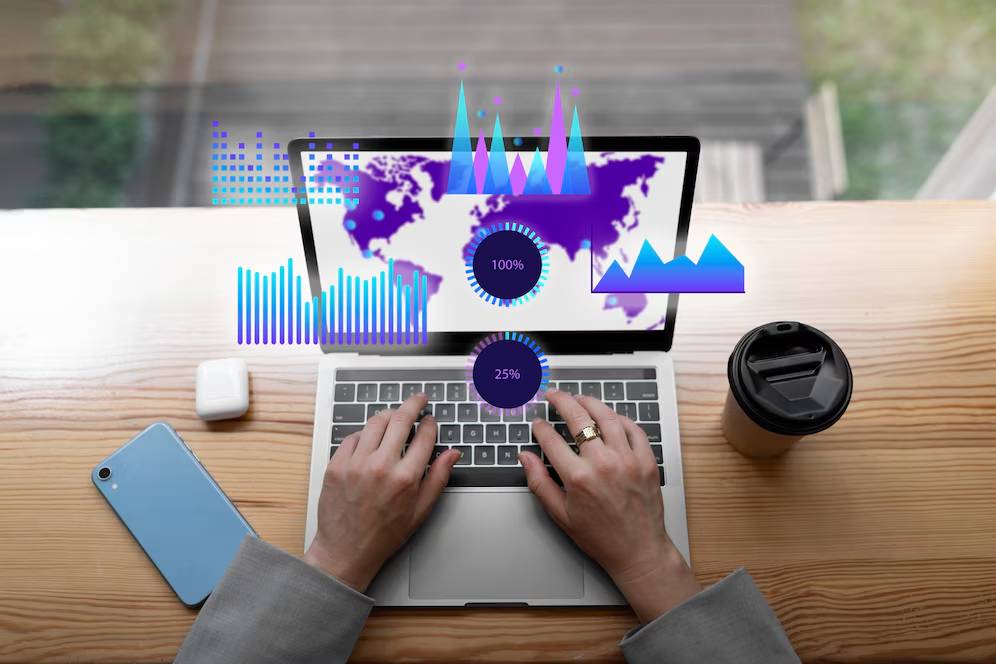
Utilising AI for Sales Forecasting in E-commerce
In the fast-changing world of e-commerce, businesses must stay ahead to succeed. One of the biggest tools available now is Artificial Intelligence (AI). It’s especially useful for sales forecasting. Using AI analytics, businesses can see consumer behaviour, market trends, and sales patterns like never before. This helps them make better decisions and plan strategically.
Why AI Sales Forecasting Matters
AI sales forecasting is revolutionising the way e-commerce businesses operate. Traditional sales forecasting uses past data and human intuition. This can lead to mistakes and may miss unexpected factors. AI uses predictive analytics to analyse big data sets. It spots patterns and makes accurate predictions. This ability is crucial for e-commerce businesses, as consumer preferences and market trends can shift quickly.
One of the key benefits of AI sales forecasting is its ability to enhance accuracy. AI models can predict future sales accurately. They do this by analysing various data points. These include past sales data, customer demographics, and external factors like economic indicators. This accuracy helps businesses manage inventory better. It reduces overstocking and stockouts. As a result, customer satisfaction improves.
Moreover, AI sales forecasting provides e-commerce businesses with real-time insights. AI can quickly process data and give real-time forecasts, much faster than traditional methods, which often take days or weeks. Agility is key in fast-paced e-commerce. Quick decisions can lead to seizing opportunities or missing them.
Real-Life Applications of AI in Sales Forecasting

Many e-commerce leaders now use AI for sales forecasting to stay ahead. Amazon, the biggest online retailer, uses AI algorithms to accurately predict product demand. Amazon looks at what customers browse, buy, and even the weather. This helps them predict which products will be popular. Then, they can change their inventory to meet that demand.
Similarly, fashion retailer ASOS employs AI-driven predictive analytics to optimise its supply chain. ASOS forecasts sales trends, which helps keep its warehouses stocked with the right products. This minimises the chance of overstocking or running out of stock. This capability boosts efficiency and improves the customer experience. It ensures popular items are always in stock.
Ocado, a grocery delivery service, also uses AI for sales forecasting. It analyses customer purchase data along with factors like holidays and promotions to accurately predict demand for different products. This precision helps the company improve logistics, cut waste, and deliver fresh groceries to customers quickly.
Key Benefits of AI-Driven Predictive Analytics
AI-driven predictive analytics offer several advantages that extend beyond sales forecasting. Businesses can analyse customer data to learn about consumer preferences and buying behaviour. They can then use this information to personalize marketing campaigns, customise product suggestions, and boost customer engagement.
Furthermore, predictive analytics can help e-commerce businesses identify emerging trends and market opportunities. AI models can track social media sentiment and online reviews, helping them spot changes in what consumers like and predict new product demands. This foresight helps businesses beat the competition and take advantage of new trends before everyone else does.
AI-driven predictive analytics also play a crucial role in risk management. Businesses can examine past data and outside factors, which helps them spot risks and create backup plans. AI models can spot patterns of fraud and alert businesses about possible security threats. This proactive approach boosts security and shields businesses and customers from financial losses.
Additional Expert Tips & Common Mistakes to Avoid
AI sales forecasting can help e-commerce businesses a lot. But to get the most out of it, they must follow best practices. One common mistake is relying solely on AI models without considering human expertise. AI can manage big data sets. Human intuition and knowledge matter a lot. They help us understand results and make wise decisions. So, businesses should work together. They need to mix AI insights with human skills.
Another mistake to avoid is neglecting data quality. AI models rely on accurate and reliable data to generate meaningful forecasts, so businesses need to keep their data clean, current, and unbiased. Strong data governance and regular audits help keep data quality high, which, in turn, improves the accuracy of AI forecasts.
Additionally, businesses should avoid using AI sales forecasting as a standalone tool. AI should be integrated into the broader e-commerce strategy to maximise its impact. Companies can boost their performance by using AI insights. This applies to marketing, inventory, and customer service. This creates a data-driven and cohesive approach.
Advanced Insights & Expert Recommendations
Businesses looking to boost AI sales forecasting can benefit by trying new techniques and technologies. One method is using machine learning algorithms to improve predictions. Machine learning models learn from new data, helping them spot patterns and make better predictions over time.
Businesses can also consider using AI alongside other technologies. These include the Internet of Things (IoT) and blockchain. IoT devices give real-time data on inventory, customer interactions, and environmental conditions. This information boosts AI models with valuable insights. Blockchain boosts data security and transparency. It ensures that AI forecasts rely on trustworthy, tamper-proof data.
Another expert recommendation is to invest in AI talent and infrastructure. A skilled team of data scientists and AI experts can help businesses improve their AI models, ensuring they meet the unique needs of the e-commerce industry. Investing in strong AI infrastructure also helps. Cloud computing and data storage make AI operations more efficient and scalable.
Conclusion: Embracing the Future of E-commerce with AI

In summary, AI sales forecasting transforms e-commerce. It provides unique insights and strong predictions. With AI-driven predictive analytics, businesses can increase accuracy, streamline operations, and keep up with trends.
To fully benefit from AI, businesses should:
- Adopt best practices
- Invest in talent and infrastructure
- Integrate AI into their overall strategies
To succeed in the changing e-commerce world, businesses must embrace AI. Its transformative power is key to thriving in a competitive market. Using AI sales forecasting helps e-commerce businesses find new opportunities. It boosts customer satisfaction and supports lasting growth. The future of e-commerce is clearly AI-driven. Those who adopt this technology will be ready to lead.